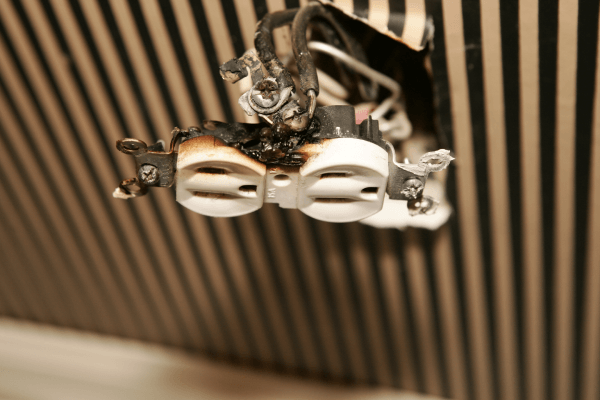
Since most of your home’s electrical components are hidden away inside walls and ceilings, it can be hard to notice when something goes wrong. However, ignoring electrical problems can lead to higher utility bills, broken appliances, and even housefires. If you want to avoid any major inconveniences, keep an eye out for these common signs of electrical issues.
Buzzing Sounds When Using Electricity
We might associate buzzing sounds with electrical power, but a functional system should be almost silent. Any noticeable buzzing sounds near your electricity should be a cause for concern. Hearing a buzzing, sizzling, or crackling noise when you use electricity can indicate loose connections, improper wiring, or other problems. Often, the sounds associated with electrical problems will occur when you flip on a light or plug something into your outlet. You may also notice them late at night when most of the home is quiet.
Frequent Circuit Tripping
Whenever a circuit is overloaded, a breaker trips automatically to prevent overheating. A tripped breaker causes all electricity in part of the home to shut off immediately. This can happen occasionally without signifying something is wrong. However, if you are getting tripped breakers every time you plug in a hairdryer or use a toaster, it means your home’s electrical system has a problem. Often, the issue is simply an outdated electrical system not meant to handle the high power demands of modern appliances and technology. To fix it, you may need an electrician to help redesign your home’s electrics.
Strange Smells
If you smell something funky in your home, your first thought probably is not that you have an electrical problem. However, the reality is that many electrical problems can cause a smell. Of course, any charred or burnt smell should be a warning sign since it can indicate sparks or small fires. Electrical problems can also cause strangely rotten or musty smells, especially if the issue is a critter dying in your electrical system. Be on the lookout for unfamiliar odors around any outlet, breaker panel, or fuse box. You may also spot small scorch marks near the source of the odd smells.
Hot Light Fixtures or Outlets
While it is true that most light fixtures will be at least a little warm, excess heat around the fixture is a problem. If you suspect an electrical issue, lightly touch the wall or the ceiling around your lights. You can also check outlet plates and the area around any outlets. Warmth in these spots can be a sign you lack insulation, which could potentially cause dangerous overheating. Exceeding your fixture’s recommended light bulb wattages may also contribute to overheating, so make sure the right bulbs are used in your lights.
Loose Outlets and Switches
Have you ever gone to plug in an item to an outlet and noticed it moves a little bit? An outlet or switch that dips into the wall slightly or wiggles to the side is not a good thing. This indicates that the outlet or switch has been installed incorrectly. Over time, the wiggling can pull wires loose, potentially causing sparks. Therefore, it is important to fix the problem as quickly as possible. Mounting outlets and switches properly is very simple, and it ensures you do not deal with more major problems.
Flickering Lights
Though flickering lights just seem like a minor inconvenience, they are actually an indication something is wrong. The most common cause for a flickering light is a power surge. This often happens when appliances are pulling in more electricity than your system can handle, leading to flickering bulbs throughout the house. Since regular power surges can damage your electronics, it is important to upgrade your wiring and stop the frequent surges. Flickering lights can also indicate a loose connection or other issues that need to be addressed promptly.
Sparking Outlets or Fixtures
Anything sparking from your electrical system is a clear and present sign of problems. A correctly installed and maintained system should never spark. This is one of the signs of electrical problems you need to address as soon as possible. Flying sparks have the potential to set your home on fire, so they can harm you and your possessions if you ignore them. There are all sorts of potential causes for sparking, so it is a good idea to have a professional examine the problem as soon as you can.
Aluminum Wiring
If your home was built in the ’60s, ’70s, or ’80s, there is a chance your wiring might be made of aluminum. To check and see what your wiring is made of, you may need to take a peek inside the walls or speak to an electrician. If you have aluminum wiring, you have a problem. Even if your aluminum wiring seems to be in good shape, it is still a big warning sign. According to the U.S. Consumer Product Safety Commission, houses with aluminum wiring are 55 times more likely to catch on fire. The problem is that this wiring oxidizes quickly when exposed, so overheating is far more likely. Therefore, you should take steps to replace it with safer wiring as soon as you can.
Shocks From Anything Connected to Your Electrical System
Do not dismiss all shocks as just harmless static electricity buildup. Instead, pay attention to when it is happening to you. If the shocks occur when you touch anything metal that is plugged or wired into your electrical system, it might be an electric issue. This is a sign that something is not properly grounded. Improper grounding can occur even when your home has three-prong receptacles since the outlets can be improperly installed. When looking out for this sign, keep in mind that it can also occur when touching your water lines, furnace, or ductwork. This happens because an ungrounded system can interact poorly with other parts of your home.
Rodents in Walls or Ceilings
In some cases, the sign of an electrical issue might not be anything obviously electrical. Rodents can cause major damage to your home’s wiring because they have a tendency to gnaw on wiring. If a wire becomes exposed, it has the chance to overheat and spark. Rodents can also end up pulling wires loose, causing various parts of your electrical system to quit working. Therefore, homeowners need to be aware of signs of rodents. The most common sign will be small, pellet-shaped droppings around various parts of the home. You might also see gnaw marks around walls, have food disappear, smell unpleasant urine odors, or hear noises moving around inside your attic and walls.
If you suspect you may have an electrical problem, it is a good idea to get a professional inspection as soon as possible. Since 1956, Black-Haak has been Fox Valley’s trusted electrical company. In addition to electrical repairs and installations, we also assist with fixing and maintaining heating and cooling systems. Find out more about our services by giving us a call today.

